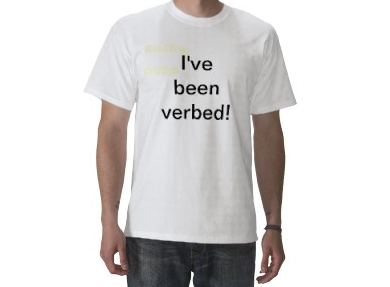Technical English and Verbing Nouns
Today, we verb a little. The Honors College at the University of Houston presents this program about the machines that make our civilization run, and the people whose ingenuity created them.
Recently I read a sentence online: "Mouse over thumbnail to enlarge." It struck me how it contains basic words like 'mouse' and 'thumbnail'; they've been around for centuries. But the sentence is only meaningful in the digital age. 'To mouse over' is to move your computer mouse over something on the screen. A 'thumbnail' is a small image you can enlarge by clicking on it. This is a pretty common activity today. But the sentence reveals some odd features of our language.

English is great for technical uses because it has a vast number of words. We've taken much from the world's languages, and currently have one of the largest vocabularies in human history. But a good technical language isn't simply based on fancy words like anastomosis or bibasilar. In the digital age, we tend to use common words metaphorically to give them a new technical sense. The pointer device with a cord resembles a mouse; so the computer 'mouse' was born. The small version of an online image is the size of a thumbnail; so 'thumbnail' acquired a new technical meaning. The old word hardware was employed to refer to these marvelous new computers. By analogy, software was coined to describe the tools within the machines: the programs. And we 'surf' the Internet on a 'browser''doesn't that sound inviting and fun?
But let's take a look at that sentence again: Mouse over thumbnail to enlarge. Here 'mouse' has become a verb. This is another feature of English that's unusual: a noun becomes a verb very quickly, with no change in its form. We do make occasional changes. Think of the noun 'house' and the verb 'to house,' where the 's' becomes vocalized. But we say 'to mouse' and not 'to mouze.' This seems to be the trend these days: no change in form is needed.
Not many languages can do this so effortlessly. In English you can chair a committee, stomach an insult, author a book, tree a raccoon, school your kids and now text a friend. You can head an initiative, tail a suspect, side with your buddy, and edge your lawn. Linguists call this 'conversion' or 'zero derivation'; a word can change its function merely by switching positions, as when 'I use the telephone' becomes simply 'I telephone.'

When you think about it, it's a wonder we don't do this more. It's a mystery that we can table a discussion, but we can't window an opportunity. We bus kids to school but we can't car them anywhere. You can shelter refugees or roof your house, but you can't lawn or yard anything. You can garden, but not anything specific. You can't garden roses, for example.
At least not yet. Internet communication makes language change so easy that there's no telling what new words may take over. We used to befriend people sparingly; now we 'friend' them by the hundreds on Facebook. We fan, like, twitter, spam, and google people in ways unthinkable ten years ago. I think I'll sofa for a while and brain up something new to author. Thanks for audiencing. Hey, you just got verbed!
I'm Richard Armstrong, at the University of Houston, where we're interested in the way inventive minds work.
Resources:
On conversion or zero derivation, see https://en.wikipedia.org/wiki/Conversion_%28linguistics%29
How many words are in the English language? These articles address the question:
http://www.slate.com/id/2139611/
http://www.worldwidewords.org/articles/howmany.htm
For general language monitoring online, see:
World Wide Words: http://www.worldwidewords.org
For a poem on the subject, read "The Verbing of America": http://ccat.sas.upenn.edu/~haroldfs/family/verbing.html.
Images:
The computer mouse and cursor image was created from Stock.XCHNG images.
Custom t-shirt image created at zazzle.com.
The picture of raccoon is from Wikimedia Commons.
